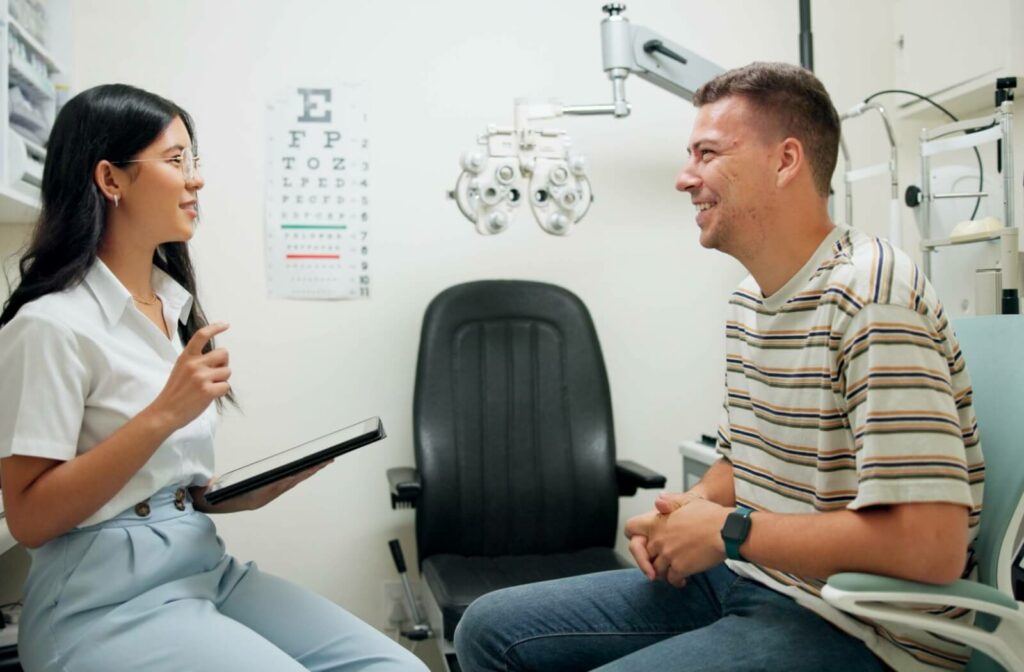If you’ve ever noticed your eyes feeling dry, itchy, or irritated during allergy season, you’re not imagining it. Seasonal allergies are known to cause a range of uncomfortable symptoms, and for many people, dry eyes are one of them. While dry eye symptoms can also stem from a variety of other causes, allergies often play a significant role especially during the spring and fall months.
At Advanced Eyecare Optometry, we’ve had many patients ask whether their allergy symptoms could be tied to their dry eyes. It’s a reasonable question, and the answer often lies in how our eyes respond to allergens like pollen, dust, or pet dander.
Understanding Allergic Reactions in the Eyes
When allergens come into contact with the eyes, the body releases histamines as part of its immune response. This reaction is meant to protect you, but it often results in redness, tearing, itching, and swelling. While these symptoms are typically associated with allergic conjunctivitis, they can also overlap with dry eye symptoms.
In some cases, your eyes might water excessively while still feeling dry. This paradox happens because the watery tears that are produced in response to irritation don’t contain the necessary components to lubricate your eyes properly. Instead of soothing the eyes, the excess tears can wash away the natural oils and proteins that help maintain eye comfort.
How Allergies Can Lead to Dryness
Dry eyes are generally a result of either not producing enough tears or having poor-quality tears that evaporate too quickly. Allergies can contribute to both of these issues.
If you frequently rub your eyes due to itchiness, this can worsen inflammation and further disrupt tear production. Inflammation in the eyelids or tear glands can also reduce the quantity and quality of your tears. Even allergy medications, such as antihistamines, can dry out the eyes by decreasing moisture production throughout the body.
Environmental allergens can exacerbate the symptoms too. Windy conditions or high pollen counts can trigger allergic reactions and dry eye symptoms simultaneously, making it more difficult to pinpoint what’s causing the discomfort.
Signs That Allergies Might Be Affecting Your Eyes
It’s not always easy to tell whether allergies or another condition is to blame for your symptoms. However, there are a few clues that suggest allergies could be involved. If your dry eye symptoms tend to flare up during certain times of year, such as spring or fall, or if they coincide with other allergy symptoms like sneezing and nasal congestion, allergies could be contributing.
Watery eyes, even when they feel dry, can be another sign. A gritty sensation, redness, or increased light sensitivity are also common in both allergic reactions and dry eye syndrome. Because the symptoms are so similar, many people benefit from a professional evaluation to determine what’s going on.
Finding Relief from Allergy-Related Dry Eyes
Fortunately, there are ways to find relief from allergy-related dry eye symptoms. Some people benefit from using artificial tears or lubricating eye drops, which can help soothe irritation and maintain eye moisture. However, not all drops are the same. Some contain ingredients that may not be ideal for allergy sufferers, so it’s worth talking with an eye care professional about which options may work well for you.
Lifestyle adjustments can also be helpful. During high pollen days, try to keep windows closed and use air filters indoors. Wearing wraparound sunglasses outside may help block some of the allergens from reaching your eyes. And when you get home at the end of the day, washing your face or even gently rinsing your eyes with a sterile saline solution can help reduce surface allergens.
If over-the-counter methods aren’t helping, a customized treatment plan from your optometrist may be more effective. At Advanced Eyecare Optometry, we’re always happy to talk through your symptoms and help you explore options that suit your needs and lifestyle.
When to See an Eye Care Professional

Dry eyes aren’t just uncomfortable, they can also interfere with your daily life and affect your eye health over time. If your symptoms persist even after allergy season has passed, it can be worth scheduling an eye exam. An eye care provider can help you determine whether allergies are the root cause, or if something else may be contributing.
Sometimes, what feels like dry eye could be a combination of factors, including allergies, screen time, or even underlying medical conditions. That’s why we take a personalized approach to eye care. By understanding the full picture, we can make better recommendations and support your comfort in the long run.
Compassionate Support, All Year Round
Whether you’re dealing with seasonal allergies or just feeling the effects of a long day in front of a computer, dry eyes are something no one wants to put up with for long. The good news is, you don’t have to navigate it alone. Getting to the bottom of your symptoms can make a real difference in your comfort.
At Advanced Eyecare Optometry, we’re proud to offer compassionate, personalized care that treats you like family. If you have questions about your symptoms, or if you’re looking for ways to feel more comfortable during allergy season, come visit us at Advanced Eyecare Optometry. we’re here to help and our friendly team is always just a phone call or visit away.




